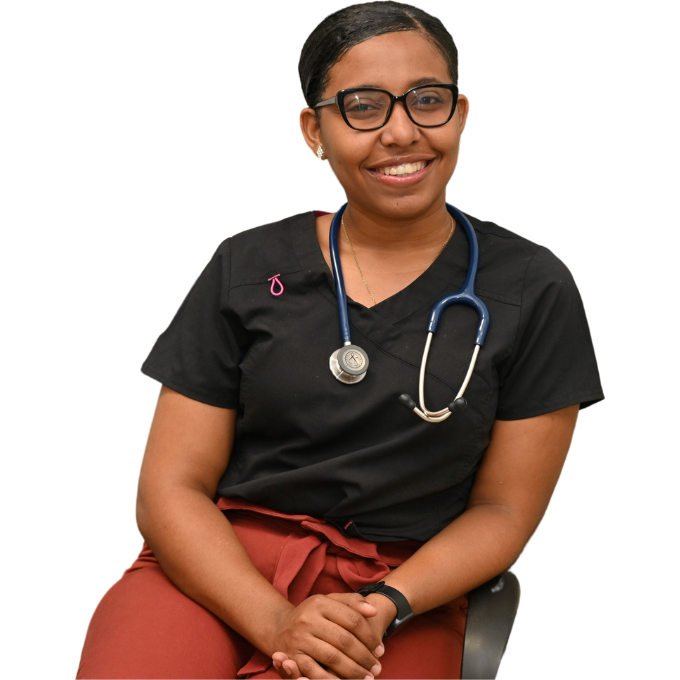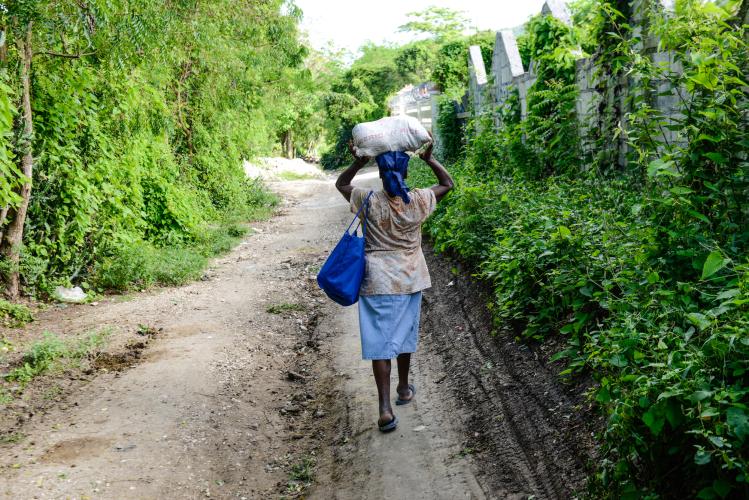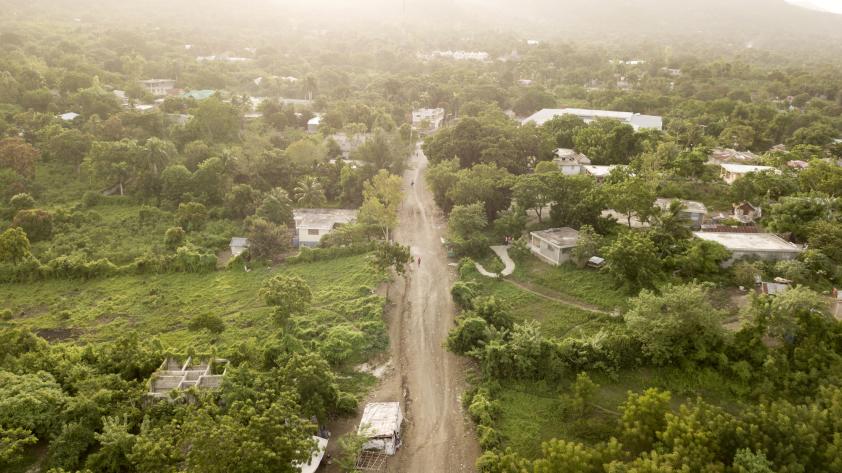“The staff provide care with heart, and it’s one of the best trainings you will receive.”
Your donation will help St. Boniface Hospital care for patients and train medical residents and interns like Marie Christ Love Robergeau.


“Today I am the happiest woman,” Eveline laughs. Ten years ago, she would never have imagined her happiness today. In 2004 Eveline (name changed to protect her privacy) was diagnosed with HIV after giving birth to her fifth child at SBH. Sadly, the baby died at just a few months old, and not long after she also lost her husband of one year to a freak accident. She was left a single mother to her four other young children, facing a deadly illness and stigma from her community and family. For several years life was bleak.
Eveline tells what it was like to live with HIV in those years. “Soon after I was diagnosed I enrolled in an HIV treatment and support program near my home north of Port-au-Prince. This program required you to enroll with the support of two people who could help administer medications and give you other support. I went with my mother and a close friend who I trusted, but soon after that visit my friend started telling people in our community about my HIV status, and that is when my nightmare began. People didn’t want to see me anymore, they didn’t want me in the community. It destroyed my motivation to live—and I had four young kids at home to feed and pay school tuition for. I was persecuted because of my (HIV) status. People wrote terrible things on my door, and all around the walls of my house; things like ‘We don’t want people with HIV here. Go Away.’ Sometimes even though I felt well enough to work I was afraid to go out because I was afraid of what people would say about me.”
Coming back to St. Boniface was like being welcomed home as a member of the family.
Eveline
Even though Eveline was depressed and terrified by the horrible way her neighbors treated her after her HIV status was made public, she was determined to stay on her medication protocol and stay healthy for her four children. She made the decision to move her family to Port-au-Prince, where she hoped that her anonymity in a new community, and in the big city, would allow them to have a fresh start.

As she started to rebuild her life and her family’s prospects in Port-au-Prince, Eveline looked for a new HIV treatment program to enroll in. Remembering the excellent care and compassionate treatment she got at SBH when giving birth to her last baby in 2004, Eveline made the four-hour trip to Fond-des-Blancs to find out about our HIV/AIDS program. At this point, in 2009, our HIV/AIDS program was in full swing, and very well respected around the country. Even though it was a long trip from her new home in Port-au-Prince, Eveline enrolled in the program because she felt she could trust the staff and other participants. “Coming back to St. Boniface was like being welcomed home as a member of the family. I was congratulated on my good health and adherence to my medication regimen and my courage in facing and overcoming my challenges. I felt as though I had come home.”
Happily, in 2009 Eveline also met her now-husband in Port-au-Prince, and in him, she found a partner who treated her with kindness and respect and did not shy away from her HIV status. “We decided not to have any secrets between us, and so I told him about my status. We fell in love, and we always protect each other. He remains HIV-free to this day.”
Her new husband wanted to have a baby, but Eveline knew the risks, both to her husband and to the child she would carry. Because she had been on an effective treatment protocol the risks were reduced, and she made sure to adhere to the PMTCT protocol (Prevention of Mother To Child Transmission) during her pregnancy. Because this protocol is highly effective, and Eveline adhered to it closely, their son was born HIV-free. “My son is now eight years old, and he and my husband have never tested positive for HIV. It is through the grace of God that we are so fortunate, and I am the happiest woman in the world!”
In 2012 Eveline decided to take another step in her life as a person living with HIV, and become a peer educator in our HIV/AIDS program. Peer educators play a critical role in an effective treatment program by providing one-on-one support and mentorship to participants. Eveline had been so welcomed by the program when she joined and was so grateful for all that it had provided to her, that she wanted to become an official part of making it a successful program for other participants. “I am proud to be a model for not only the program but also for other HIV patients. Patients are often reluctant to take their medication, for many reasons, and that gives the HIV virus more opportunity to destroy their defenses. My role is to give them hope and faith that if I can adhere to the protocol and be healthy and active, it means they can move on and live and thrive with this disease as well.”
I am proud to be a model for not only the program but also for other HIV patients.
Eveline
As a peer educator, Eveline is able to share her success at keeping HIV under control, and help other people living with HIV/AIDS adhere to their treatment protocols and feel supported and welcomed into the program’s community. With such a stigmatized disease, the community that people find within the treatment program can be a lifeline to a brighter future. Eveline is proud to be part of that story.
Eveline recalls one favorite patient whose life changed dramatically over the course of her work with him. “He was a young man who got a routine screening and tested positive for HIV. He was very upset after the diagnosis. He did not want to live anymore. He saw a psychologist and other counselors, but without remarkable success. So, I tried to talk to him, and he did not believe I was also a patient until I showed him my medications. I continue to talk to him, and mentor him, and he began to see a way to a good future for himself. We became good friends, and now he is 30 years old, and lives his life, works, and is a very productive member of society while living with this disease.”
“I wish that all people with my status would be accepted in society,” Eveline says. “We can work, we have children, we help others. We are human just like everyone else.” Stigma is still strong and forces many people living with HIV/AIDS to hide their status at all costs. But in the [HEI/SBH] HIV/AIDS program, people living with the disease find community and support. Eveline values this and is grateful for it. “The supporters of this program do so much, and we are so thankful for their contributions that help with medications, treatment support, food, and tuition for the children. There is always more that needs to be done, and I hope that they will continue to do more and more to support people living with HIV/AIDS in this country.”
Your donation will help St. Boniface Hospital care for patients and train medical residents and interns like Marie Christ Love Robergeau.
